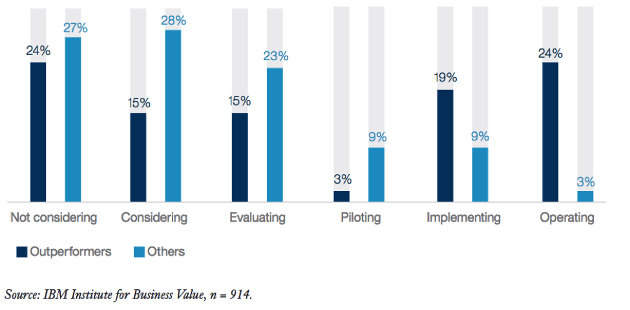It's Monday morning, and the fire drills have already begun. Your boss wants campaign results yesterday. Only 0.2% of recipients opened your latest offer email. Customer Support tells you mobile customers are having trouble with the check-out process. Web revenue is down from last week—again.
In this too-relatable nightmare scenario, one marketer will grit her teeth and prepare for a week of late nights and tense interactions wrestling with problems. Another, more progressive marketer, will confidently approach those problems as she would a series of speed bumps—to be swiftly put behind her and not fretted over. She'll solve them before lunch and spend the afternoon enacting a data-backed strategy to get back on the right path.
That latter scenario reflects the promise of AI-powered marketing.
AI-powered marketing has arrived
We've been hearing about it for years, and now it's here. More and more large and niche solution providers are claiming AI-enhanced capabilities, and analysts and industry observers are taking note. IDC, for example, just released its MarketScape: Worldwide Artificial Intelligence in Enterprise Marketing Clouds 2017 Vendor Assessment.
But before we dive into solutions, let's put some parameters around what tends to be a nebulous conversation.
What is AI?
Different companies and people can mean different things when they talk about AI, but shifting definitions refer to common capabilities. AI will...
- Understand unstructured data
- Reason to form hypotheses
- Learn from experience
- Interact with humans naturally
In short, AI scales human-like intelligence qualities through computer systems. AI-powered marketing applies those capabilities to our shared business discipline.
AI-powered marketing comes to life in tools or platforms that are embedded with pre-built AI capabilities. That is, the AI feels like the software itself. This is the breakthrough of AI-powered marketing tools: They shouldn't require a data scientist to glean value from them. There's no training needed in order for the AI to learn the discipline of marketing. The AI simply disappears into the tools you use daily, making your customer experiences better—and your day easier.
So how does this promise translate into the real business world? AI is delivering measurable value at marketing departments across the globe. AI-powered marketing practitioners regularly do the following:
- Capture and measure end-to-end customer data
- Attribute ROI to channels and activities
- Save daily work hours by automating tasks
- Diagnose customer experience issues and expedite fixes
- Hyper-personalize and hyper-target at scale
Every day companies across industries realize this value by embedding AI in their day-to-day operations. AI helps marketers work smarter in myriad ways. For example, our marketing customers use AI to...
- Increase conversion rates by swiftly detecting and remediating online customer friction points
- Segment their customer bases by predicted likelihood to disengage so they can enact retention strategies
- Analyze sentiment in marketing messages to optimize engagement
- Ask questions about campaign performance instead of continually running reports
- Deliver tailored customer experiences based on real-time weather data
But not every marketer is harnessing AI, and not all who do are practicing AI-powered marketing to the same level.
View From the C-Suite
IBM surveyed 525 CMOs across 18 industries worldwide. For this executive group, AI-powered marketing's real advantage lies in two key areas: improved customer experience and financial results (increased yields, as well as the ability to confidently identify marketing ROI). Furthermore, according to the C-suite, AI-powered marketing is solving or is expected to solve the following challenges and deliver the following benefits:
Challenges solved Value delivered
- 1. Inability to differentiate digital experiences for target audience
- 2. Difficulty determining marketing ROI
- 3. Poor marketing program yields
- 4. Difficulty delivering integrated, personalized experiences
- 5. Inability to provide real-time support for customers
- 1. Customer satisfaction
- 2. Revenue growth from large orders (tie with 3)
- 3. Customer-retention improvement (tie with 2)
- 4. Revenue growth from shorter sales cycle
- 5. Customer-acquisition cost reduction
How mature is AI-powered marketing?
AI-powered marketing has arrived, but who's practicing, and how far along are they? We asked that question as part of a global survey of 917 sales and marketing executives across industries. We asked the same executives to self-report on their organization's performance over the previous three years. Just 13% of the group qualified as "outperformers" by reporting that their companies significantly outperformed their competition for the previous three years in revenue growth, profitability, or efficiency and effectiveness in achieving objectives. We were unsurprised to see a correlation between outperformers and strong AI adoption.
Unquestionably, most outperformers are further along in their cognitive technology (AI) journeys than other companies. About a quarter of outperformers report cognitive is already operational at their organizations. A fraction of other respondents, a mere 3%, claim the same.
Most other respondents are in the earlier stages of consideration and evaluation or aren't considering cognitive at this time. There is also a contingent of outperformers who have no plans for cognitive today, but only 10% of outperformers report that their companies are unlikely to implement cognitive solutions in the future.
Stages of AI Adoption

If you're behind, don't worry
AI can be intimidating. Marketers may believe that their organizations are not ready for such advanced technologies. To them, we say: Fear not. AI-powered marketing is a journey that begins with a small step. But that step must be taken soon; laggards are at risk of disruption and irrelevance in the near future of marketing.
Many marketers think they will be required to "rip and replace" the tools and processes they use to analyze customer data and create customer experiences. However, such a drastic step is unnecessary—and, in fact, inadvisable if your organization is not culturally ready for it.
We encourage aspiring AI-powered marketing practitioners to consider which pain points hold them back day-to-day and how they may address these problems with AI.
Marketing automation, personalization, content tagging, data integration, journey analysis, and online customer experience have progressed markedly with the advent of AI-powered marketing. Consequently, solutions in those areas have become great starting points for AI-powered marketers.
Focusing on individual challenges, marketers can adopt AI in stages to target specific areas, usually integrating AI into their existing Cloud platforms and data management systems. Doing so constitutes a low-risk start to a journey that can lead to a differentiating AI-powered marketing ecosystem.
AI Vanguard Case Study: Reinventing the Customer Experience in Travel
A global airline is testing a conversational commerce system so travelers can say goodbye to traditional search engines and travel distribution aggregators. By collecting traveler preferences, trip plans, and profile details using natural-language interactions, the system generates personalized travel recommendations that are refined through on-going dialogue with the traveler. The system will also apply insights derived from the analysis of thousands of other traveler interactions, improving the odds that it will make spot-on recommendations.
AI is here, and with new value delivered to marketers every day, it is rapidly forming the future of marketing. And for those who adopt and begin delivering best-in-class experiences to customers while accelerating marketing ROI, the future is bright.
For more on AI-powered marketing, visit IBM Watson Marketing.




